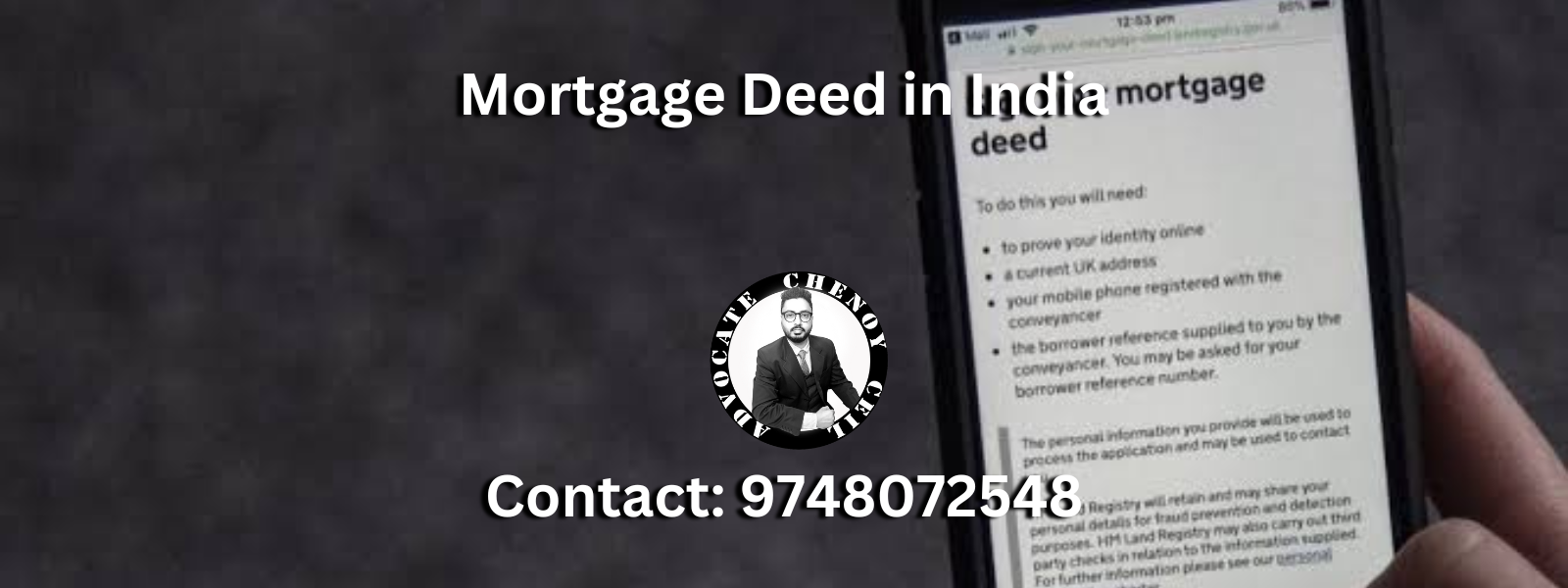The concept of the Mortgage Deed and its relevant topics come under Sections 58 to 104 of the Transfer of Property Act, 1882.
What is a Mortgage Deed?
In simple terms, a Mortgage means the transfer of interest on the property to secure the loan advanced or to be advanced in the future. An individual mortgages a property to take a loan for some purpose from a bank or individuals and in return Mortgage the property with them as a security that if he/she fails/defaults in payment of the loan then the bank or the individual can recover the same from the Mortgage property. An individual or any person who Mortgages his/her property is known as a Mortgagor and the person or an individual to whom the property is Mortgaged is known as a Mortgagee. You should also learn about the process of hypothecation and mortgage.
Most common forms of mortgages:
Simple Mortgage or Registered Mortgage [Section 58(b)] –
According to Section 58(2) of the Act, a property can be mortgaged by a person without handing over the possession of the property and binding himself to pay the mortgage money personally by executing a mortgage deed where he/she assures that if the money is not paid then Mortgagee will have the right over the property and can also sell the same to recover the mortgaged money.
Mortgage By Deposit of Title Deeds [Section 58(f)] –
Section 58(f) of the Transfer of Property Act, provides that an individual or any person can give his or her title deeds of immovable property to the banks as a security in the notified towns specified by the State Government in the official gazette.
Essential elements of the Mortgage by deposit of title deeds:
- There must be a debt.
- There must be delivery or deposit of title deeds.
- There must be an intention to submit the deed to secure the loan.
- There are territorial restrictions.
Other Mortgages include:
- Mortgage by Conditional Sale: The Mortgage is an ostensible sale with the condition that the property will be returned to the owner of the property after clearing the loan amount which was taken for some purpose by the Mortgagor.
- Usufructuary Mortgage: This type of Mortgages state that the possession of the immovable property is transferred to the Mortgagee and the Mortgagee can also earn income from the same property.
- English Mortgage: In this type of Mortgage, the Mortgagor binds himself to pay the money on a specified date as per the agreement after the transfer of the property.
- Anomalous Mortgage: Combination of the above Mortgages or any other Mortgages falls under Anomalous Mortgage.
What is a Mortgage Deed?
A Mortgage deed is a legal document that contains certain terms and conditions relating to the Mortgage. A mortgage Deed is made when a Mortgagor mortgages his property to the Mortgagee for a loan. The Mortgagor binds himself to repay the amount taken as loan from the Mortgagee by this mortgage deed and if the loan is not paid then the Mortgagee has the right to sell the property or inherit the property according to the mortgage deed.
Registration of Mortgage Deed:
Registration of mortgage deeds is essential to give legal validity to the document. In the case of a Mortgage by Delivery of Title Deed, registration is not required. You should also be informed about the rights of the mortgagor and mortgagee in a mortgage deed. The following are the conditions that need to be fulfilled for a valid registration:
- The deed must be signed by the Mortgagor.
- At least two witnesses must attest to the deed.
- Stamp duty must be paid accordingly; otherwise, the document is not enforceable.
When is the Mortgage Deed required?
- It is generally required when you are loaning money from another person or business and want to transfer the interest of the property to another person.
- When you want to borrow money and are required to mortgage your property as collateral. The deed helps you secure your rights and interest in the property.
Why is the Mortgage Deed required?
- The first and foremost requirement of the mortgage deed is to determine the parties to the deed, i.e. the Borrower/Mortgagor and the lender/Mortgagee.
- The deed enforces the rights of the lender in the Court. It ensures that in case of a default or delay in repayment of the loan, the lender will get paid by selling the property.
- The mortgagee has the right to foreclose on the property in case the mortgagor stops paying or breaches the terms of the Contract.
- The deed gives a thorough investigation as to the interest and title over the property. It helps to determine the rightful owner of the mortgaged property.
- The mortgage deed helps to determine the loan amount and the rate of interest.
- The mortgage deed also gives the right to the mortgagee to take possession of the property, if specified in the Contract.
- The mortgage deed acts as evidence that the property is transferred to the lender.
Mortgage Deed Importance:
This article speaks about mortgage and mortgage deeds and the relevant topics that one should know before mortgaging their property. The home loan EMI calculator can also help with calculating your mortgage and understanding the interest on the loan that would be applicable. To understand the different types of mortgages and the mortgage that will be applicable in your case, consult an experienced property lawyer.
